Allgemein
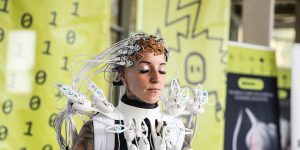
The Pangolin Scales
Thomas Faseth (AT), Harald Pretl (AT), Christoph Guger (AT), Anouk Wipprecht (NL)
The Pangolin Scales demonstrates the world’s first 1.024 channel brain-computer interface (BCI), which is able to extract information from the human brain with an unprecedented resolution to control an interactive, fashionable dress.
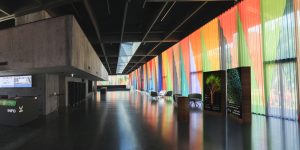
Treeversity
Johann Höller (AT), Thomas Lorenz (AT), Florian Gruber (AT), Ursula Niederländer (AT), Tanja Illetits-Motta (AT), Raphael Blasi (AT), Andreas Rösch (IT), Stefan Küll (AT)
Treeversity focuses on the relation between Big Data and data visualization to convey complex information at a glance. A mirror of the university’s inner workings, diligently recording success, failure and evolution. A portrait of its life in the form of a tree. Courses, grades and exams become branches, creating many different trees. Fully grown or nascent, withering or growing erratically. Treeversity shows the university as a forest, providing a tool to analyze its mechanisms at the same time.
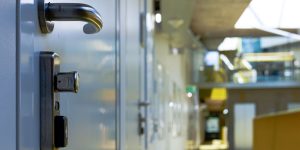
Exposed Building
Michael Roland (AT), Michael Mayr (AT), Robert Holzinger (AT), Markus Vogl (AT)
By opening a maintenance hatch and hacking into the network infrastructure behind it, we acquire access to the electronic locking system. By controlling the buzzers built into the office door locks, we transform the Science Park 2 building into an orchestra and it resounds like a huge walk-in instrument. The installation playfully provokes thought about the vulnerability of modern technology and its growing risks for society.
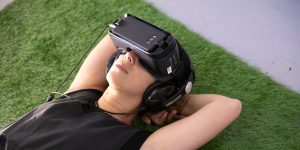
State of Intimacy
Interface Cultures, University of Art and Design Linz
In the field of media art and technology we often discussed, until recently, how to design intimate technology. And the desire to be departing, like Harry Potter, from Platform 9 ¾ seemed to be a major incentive for augmenting and mixing realities. Until last spring, when the University of Art and Design in Linz had to close and a lockdown immersed us all, unwillingly, in a virtual world whilst the physical world seemed to be replaced by daily statistics. This is the context for the Interface Cultures students who worked, for the full 2020 summer semester, in confinement on their projects for this exhibition.
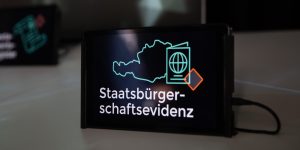
Digital Government in a Box
LIT Law Lab, Johannes Kepler University (AT)
From the “transparent citizen” and “social scoring” to AI-supported truth finding in the courtroom and machine-generated administrative notices: the digitization of administration and jurisdiction has many facets. It requires not only a consideration of what is technically possible, but also of what is legally permissible and what is desired in terms of legal policy. Against this background, the LIT Law Lab has two installations dedicated to the legal framework conditions (fundamental rights and data protection), problems and proposed solutions for a digitized enforcement.

Al truth machine
LIT Law Lab, Johannes Kepler Universität (AT)
From the “transparent citizen” and ”social scoring” to AI-supported truth finding in the courtroom and machine-generated administrative notices: the digitization of administration and jurisdiction has many facets. It requires not only a consideration of what is technically possible, but also what is legally permissible and what is desired in terms of legal policy. Against this background, the LIT Law Lab has two installations dedicated to the legal framework conditions (fundamental rights and data protection), problems and proposed solutions for a digitized enforcement.
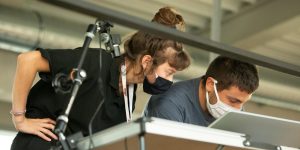
Performance Workshop: Enacting Innovation
Judith Igelsböck (AT), Friedrich Kirschner (DE), Sarah Buser (CH), Mónica Rikić (ES), Leoni Voegelin (CH), Tomás Montes Massa (CL), Laura Zoelzer (DE)
Enacting Innovation is a participatory staging of the social fabric surrounding contemporary innovation practices. Participants will negotiate the roles and situations that are frequently encountered in innovation processes and act out conflicts with each other and the technical infrastructures typically employed within such contexts. The simulation is inspired by research on ‘innovation scripts’ – the recipes followed in dealing with the omnipresent pressure to prove innovative ability.
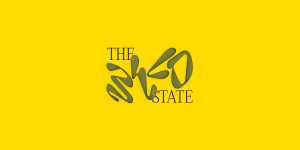
The Wild State
Campus
THE WILD STATE is the title of this year’s Kunstuniversität Campus activities at Hauptplatz Linz during Ars Electronica Festival 2020 from 9. – 13. September 2020. Existing since 2002, the intention of the Campus format is to invite outstanding international universities working in the academic fields of media arts and design. This year with an exhibition with contributions by various partner universities, as well as the departments Interface Cultures, Visual Communication, Fashion&Technology, Art Education, and Design: Tech.Tex. Special events comprise façade projection “Interfacing Hauptplatz”, the Internet flea market “Yami-ichi”, discursive format “Agora Digitalis” and the top notch nightline “Sound Campus”.
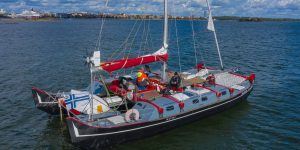
Uncertain Practices
Aalto University (FI)
Uncertainty requies that one be able to cope with doubt, something that 2020 took to unusual lengths. uncertainty is also the basis for experimental art practices. The Aalto Garden presents three artists ―Koray Tahiroğlu, Laura Beloff and Andy Best― working through AI, music, artificial biology and an art-science network platform through studio visits, talks and a performance. The Aalto Garden events are produced by Aalto Studios at Aalto University.
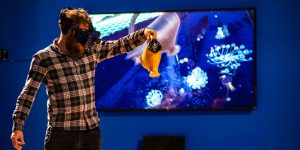
MU Worlding Worlds
Hybrid Art House (NL)
From philosophy via science fiction writing and cinema to contemporary performance, gaming, art and architecture worldbuilding is being used to create alternative scenarios and compelling futurities – visions we need especially in a time of radical transition. Worlding Worlds brings together 13 immersive installations by just as many international artists and designers, using real and virtual media to challenge and oppose dominant views by opening up and giving voice to possible other realities, now and in the (near) future.
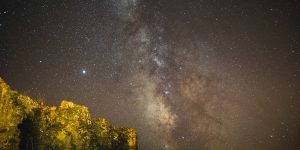
The Night Sky: Unveiling What Only the Dark Reveals
Open Science Hub - Portugal, Municipality of Figueira de Castelo Rodrigo (PT)
Open Science Hub - Portugal (OSHub-PT; Plataforma de Ciência Aberta) is a social innovation project that brings together science, technology and innovation with the daily life of local and regional communities, supporting schools and societal actors in tackling local relevant challenges. It is a project of the Municipality of Figueira de Castelo Rodrigo, in collaboration with Leiden University.
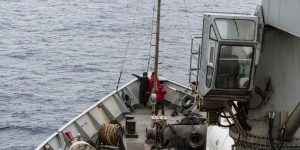
Achaeoscillator_Towards incorporeal forms of sensing listening and gaze
Terra Australis Ignota Research Group (CL) with Santiago Museum of Contemporary Art (MAC)
Achæoscillator displays the drastic weather conditions of the southernmost island in the world on a virtualized representation of the end/beginning of the Americas. A one-person experience, where the research presents traces and connections between the ancestors of the Yagán community, the Kawesqar and Selk’nam and the Antarctic, Scotia and South America continental plates, offering an inestimable and uncontrollable source of Gaia's power.
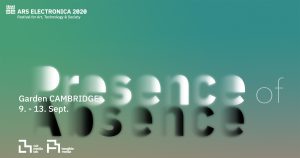
Presence of Absence
Tangible Media Group | MIT Media Lab (US)
The Cambridge Garden by Tangible Media Group for Ars Electronica Festival 2020, we will be featuring selected projects that materialize the Presence of Absence. Our garden introduces the latest in Tangible Telepresence research to engage people who collaborate across time and space with synchronized tangibles. We also feature a variety of dynamic computational materials we call Radical Atoms that foster a new form of human-material interactions.
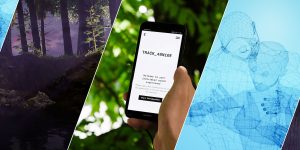
SENSING EXTENDED REALITIES Gardens
XR HUB Bavaria, University of Applied Sciences Augsburg, TUM Munich, LMU Munich (DE)
An interdisciplinary research-creation project in which we explore human senses in the context of extended realities and design interfaces in-between the real world and abstract data space in the field of the Arts.
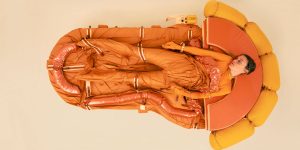
Real Feelings. Emotion and Technology
HeK (House of Electronic Arts Basel) (CH)
Emotions are at the core of human experience. They influence every aspect of our lives and shape our social behaviour. In the 21st century, technology has started to engage with emotions like never before. The international group show at HeK presents works by 20 artists ―in mediums ranging from artificial intelligence, interactive installations, robotics and biometrics to gaming, video installations and virtual reality by 20 artists― that explore how technology can assess and trigger our emotions.
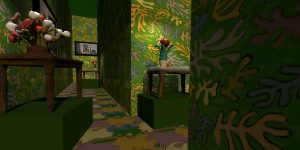
Claudia Hart’s The Ruins
bitforms gallery, New York (US)
The Ruins is an exhibition that implements still lifes to contemplate the canons of a patriarchal Western civilization: modernist paintings and manifestos of political utopias. Join Hart in an intimate video profile as she discusses the works as meditations on a world in crisis, speaking to an unstable present experienced through the possibility of simulation-technologies that use data to model the crystallization of past, future, and present into a perpetual now.
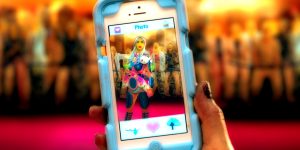
Thoma Foundation’s pioneering Digital & Electronic Art collection
Carl & Marilynn Thoma Art Foundation, Santa Fe, New Mexico (US)
The Thoma Foundation’s Curator of Digital Art, Jason Foumberg, leads a behind-the-scenes video tour through the Foundation’s Digital & Electronic Art collection, offering personal anecdotes about the artworks that excite him, how the Foundation decides which artworks to collect, and a peek into our public exhibition space and private art storage vault. Foumberg’s lushly illustrated talk is organized around the Ars Electronica 2020 festival theme of Autonomy, especially spotlighting digital artists who use technology to automate creative labor and increase viewer interaction.
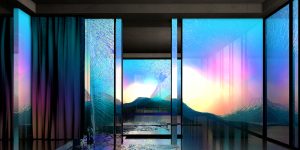
Galerie Charlot: 10 Year Anniversary Exhibition
Galerie Charlot (FR / IS)
The Paris and Tel Aviv-based Galerie Charlot celebrates its tenth year with an anniversary exhibition in Paris. The curated show features currently represented artists, showing a diversity of approaches to media over several generations.
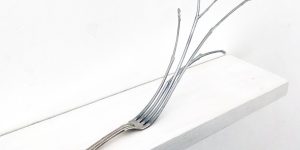
Markus Hofer “Visuelle Hypothese” – an exhibition @ AAA project space of MAM Mario Mauroner Contemporary Art Vienna
MAM Mario Mauroner Contemporary Art Vienna (AT)
The focus of Markus Hofer’s exhibition “Visuelle Hypothese” is the process of visual perception, in which our brain is supplied with information about objects visible in space through the retinal and optic nerve, and compares them objects to remembered and memorized objects. It is only by matching our memory to what we have seen that we can recognize an object and determine its function.
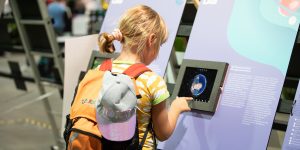
Welcome to spaceEU Linz
Ars Electronica (AT)
Ars Electronica has a long history of working with space related content and narratives. The EU project spaceEU allowed them to open new collaborations on a European level. Together with eleven organizations, Ars Electronica developed and produced a wide range of space engagement activities addressing youth, families and teachers.


